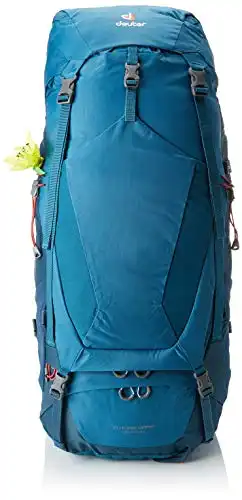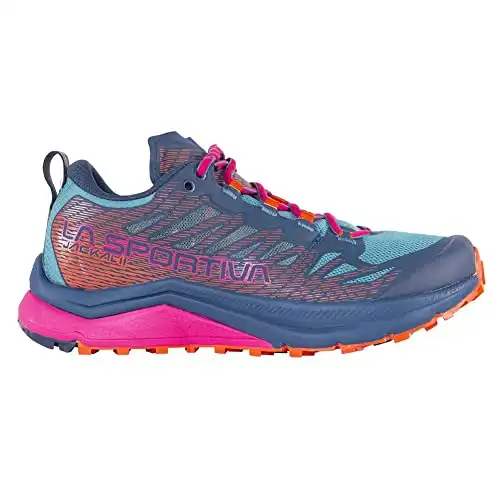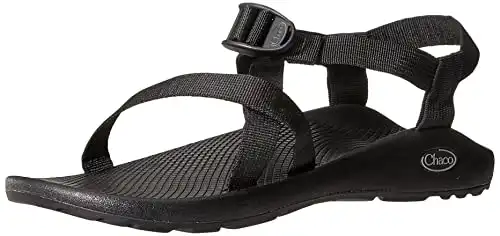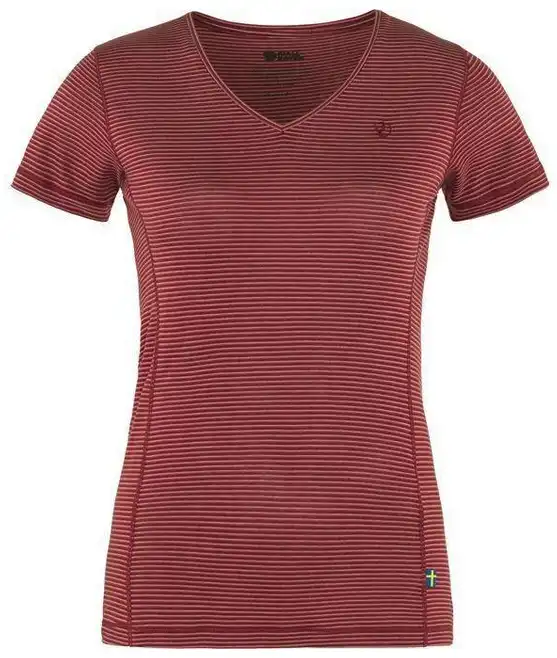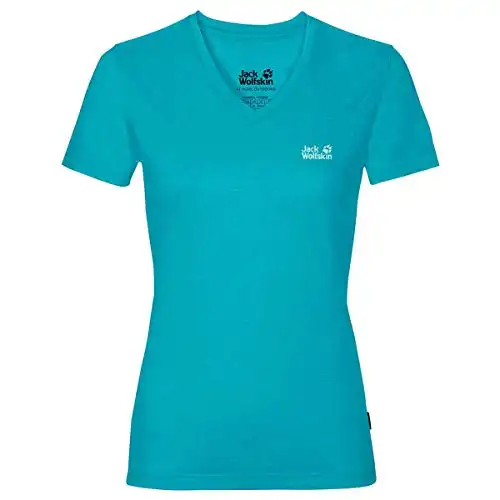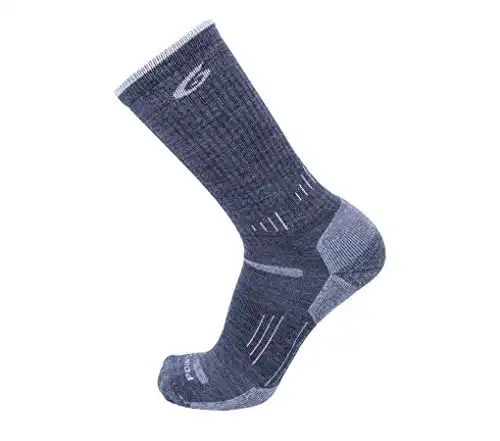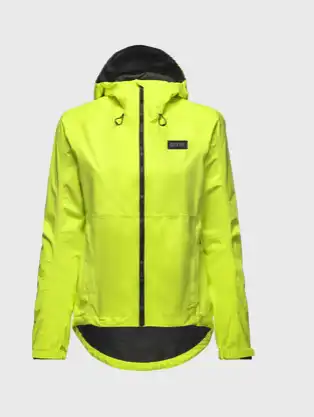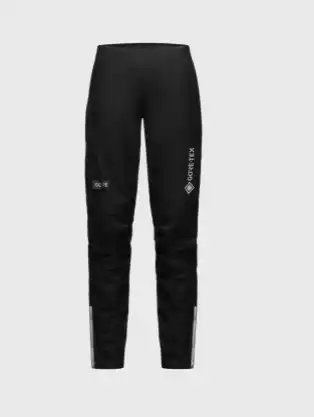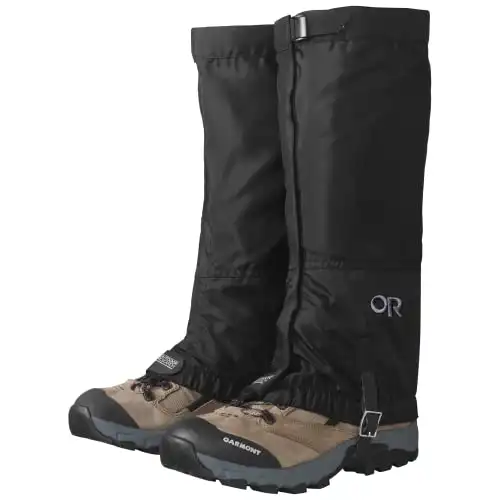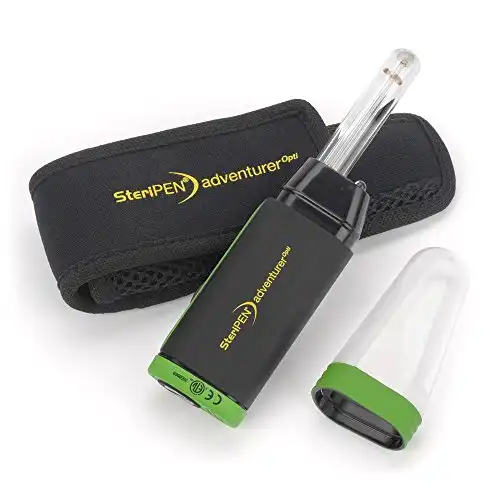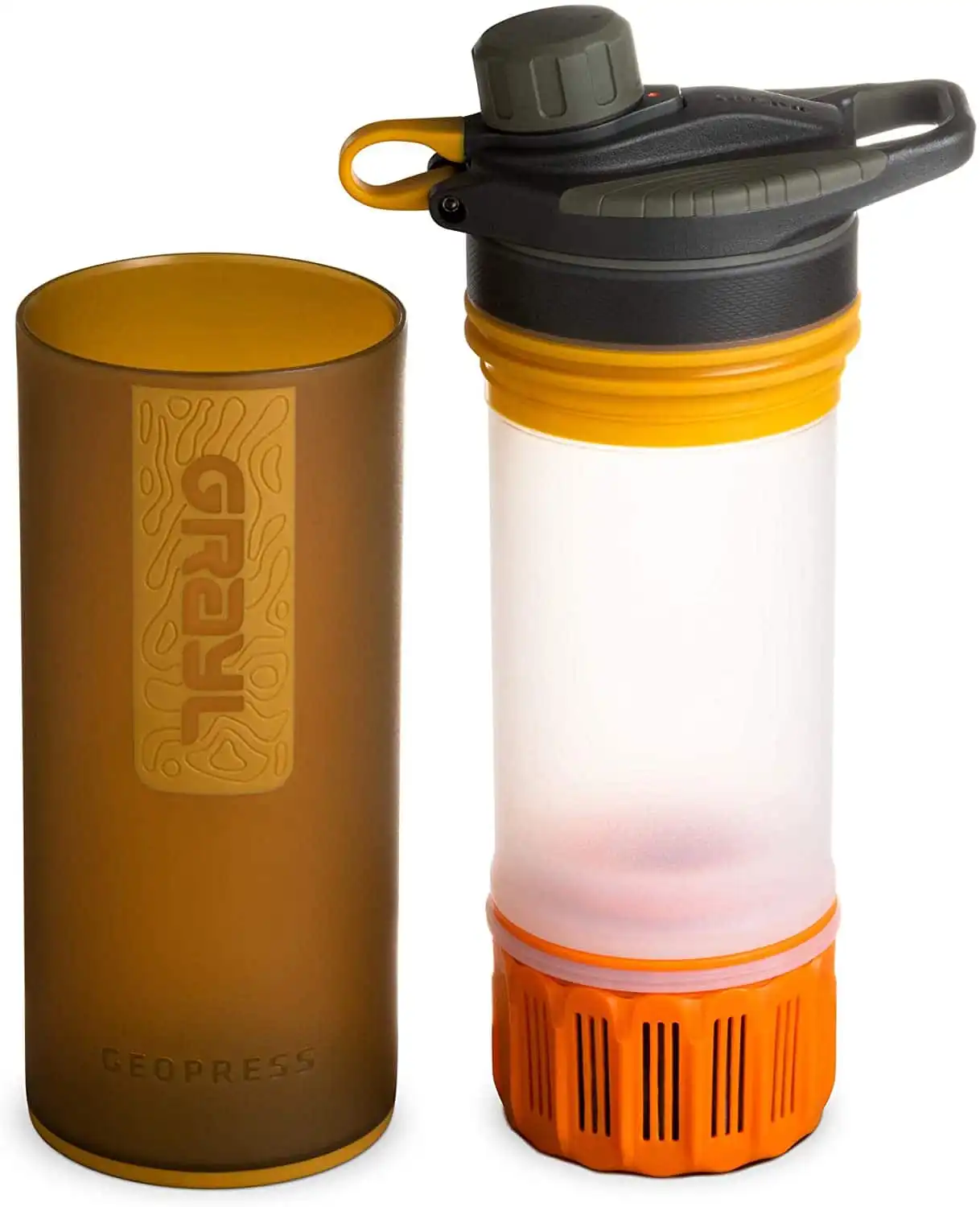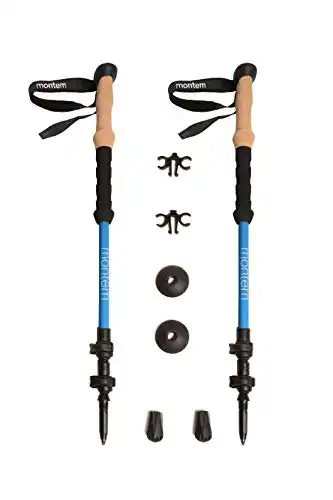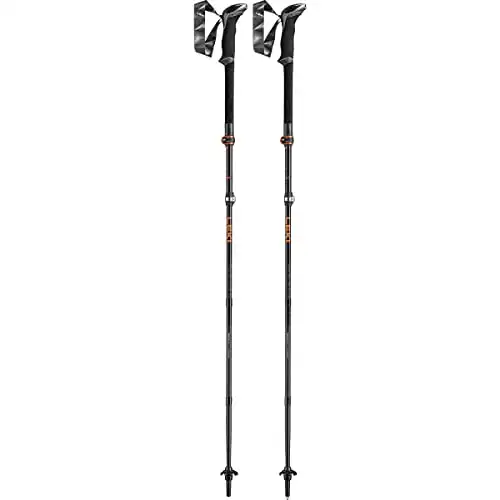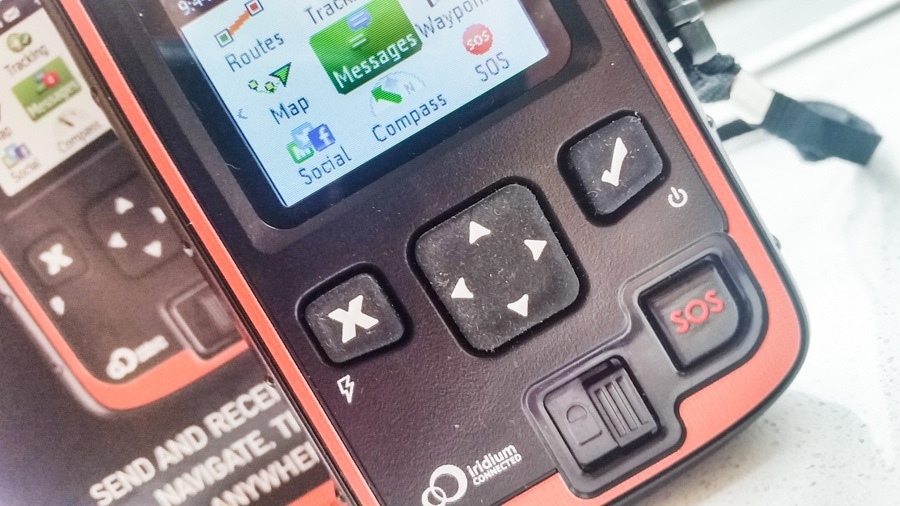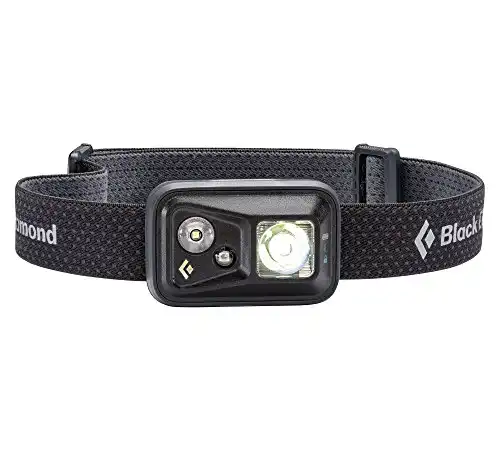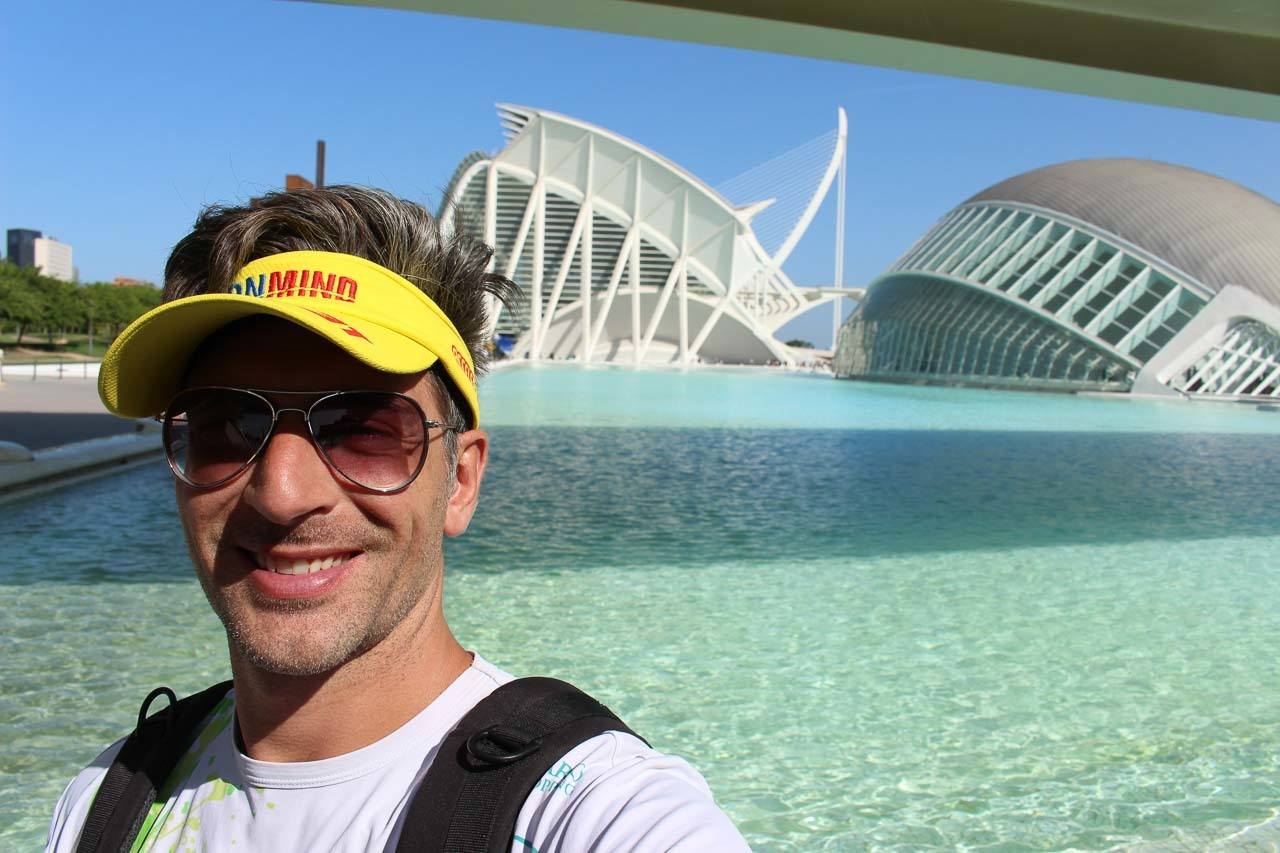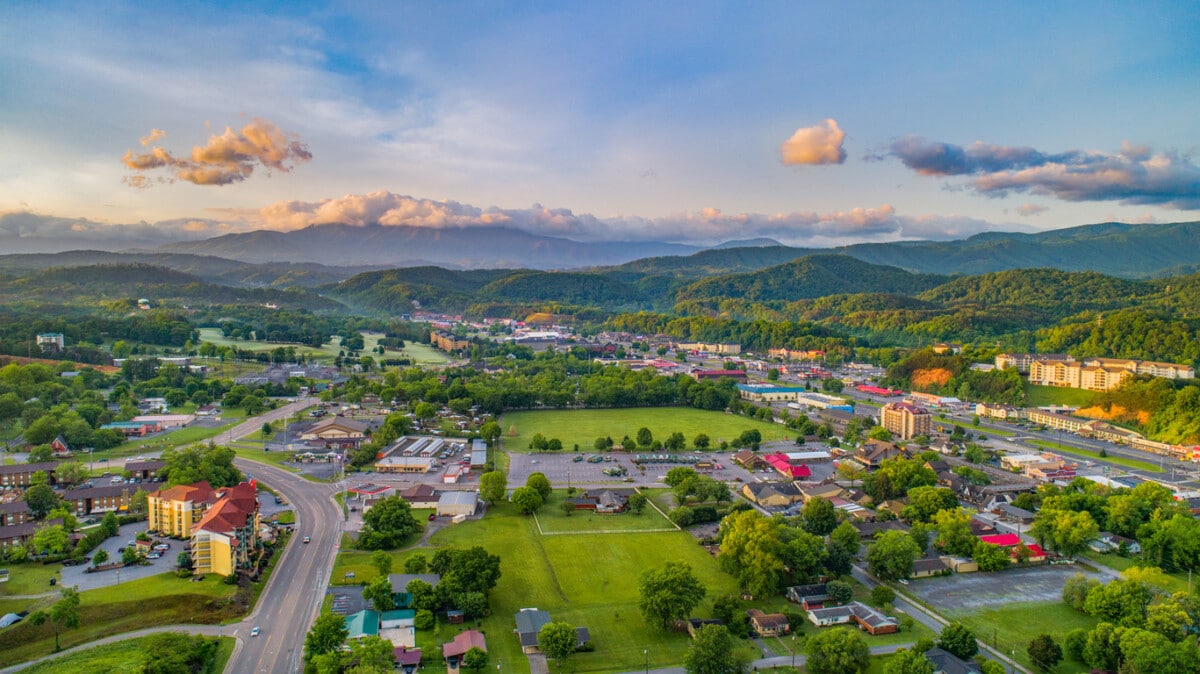Essential Hiking Gear for Any Hike
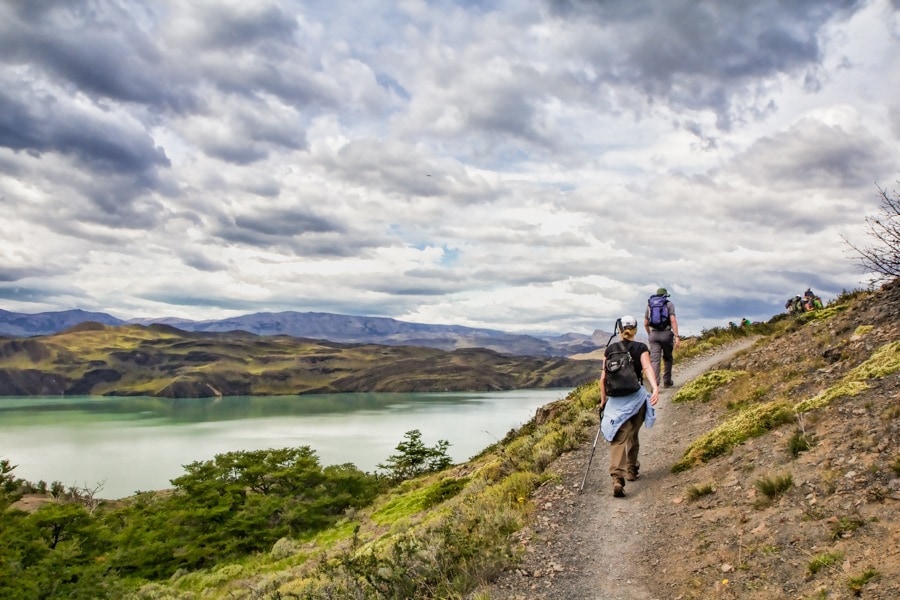
Table of Contents
There are many kinds of hiking – day hikes, multi-day hikes, long-distance hiking, circuit hiking, pilgrimages, hut-to-hut hikes, bushwalking, thru-hikes, and more. I’ve done and enjoyed them all. Over the years, I’ve gotten a lot of practice at packing the perfect hiking gear for the specific hike I’ve got planned. Now I’ve finally put all of this experience into an essential hiking packing list – good for any kind of hike.
The one thing this hiking packing list doesn’t cover is ALL of the gear you may need for true backpacking – such as camp stoves, camp food, etc.
How This Hiking Packing List Works
First – I update this list every year with new things I’ve tried or remove things that are no longer available. It was last updated in March 2023. I test out this gear personally by taking it out on hikes and traveling with it. Living in Colorado means I do a lot of hiking around the home, but I also do a lot of hiking trips all around the world.
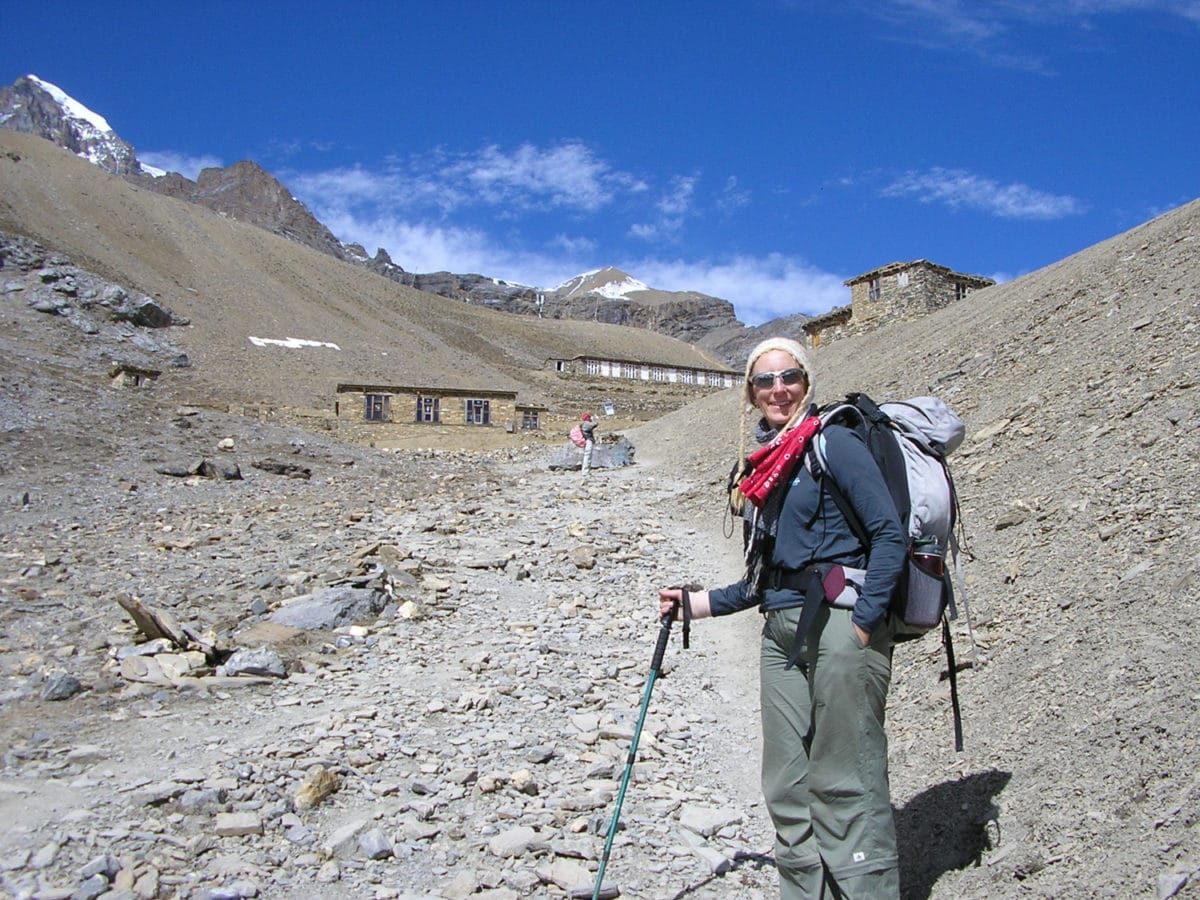
I take hiking gear really seriously. Unlike many publications, I believe that reviewing a piece of gear implies actually using that piece of gear for an extended amount of time. I use the gear I’m writing about, not just once, but many times. This isn’t simply about getting you to shop on Amazon, it’s about getting you the best hiking gear for your next adventure.
For each type of hike, your packing list needs vary. Sometimes you are staying in tents, sometimes guesthouses, and sometimes hotels. In addition, things like temperature, weather, and terrain factor into your gear needs. Because there are so many variations, here’s how this gear list works:
I’ve provided you with several categories of gear that I’ve found are essential on every hiking packing list, no matter the type.
In each category, I give you a few tips and things to look for in your gear, as well as specific suggestions for items that I’ve used and liked. When a variation becomes necessary based on the type of hike (day hike vs. thru-hike), I’ll give you a few different suggestions based on the different types of hikes.
I’ve also included a free downloadable hiking packing list that highlights a day hike packing list for you to print out and use. Simply sign up and I’ll email it to you so you can check things off and make sure nothing is forgotten!
Downloadable Hiking Packing List
Make sense? Let’s get you packed and on the trail!
Choose The Hike You Want To Do
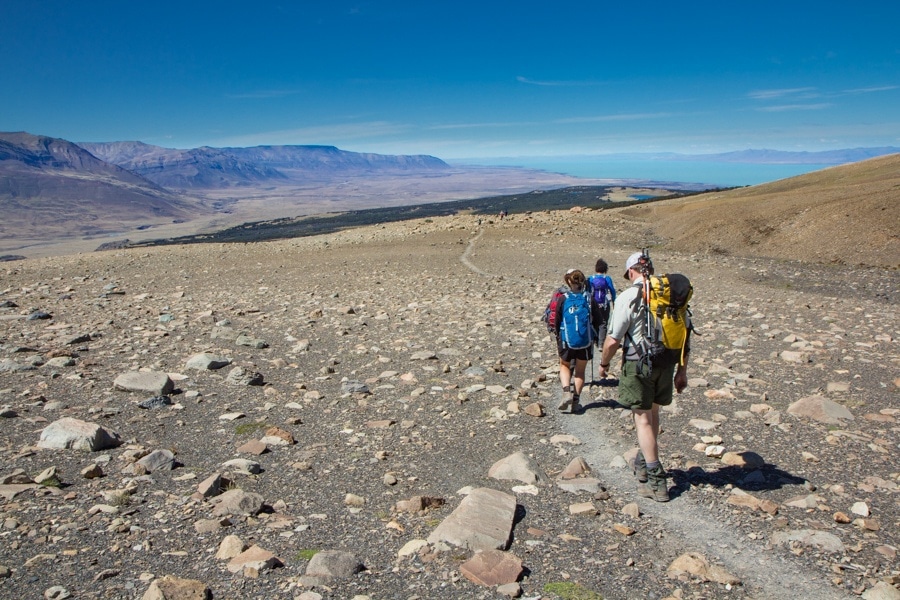
Before you work on your hiking packing list, you first need to know what kind of hike you are going to do.
Some things you’ll need to consider about your chosen hike (that will impact your hiking packing list) include:
- Hike Duration: Will it be a long multi-day trek or a day hike?
- Difficulty & Terrain: Will there be flat paths? Squelchy mud puddles? Rocky climbing sections?
- Time of year: Will it be cold? Will there be lots of other people? How early will it be dark?
- Climate/weather: Rainy or dry? Will it be cold rain or warm rain? Will it get colder after a certain time of day?
- Safety: Will you be camping or off the grid?
Favorite Hikes I’ve Done
I’ve written about many, so here are some of my favorite hikes I’ve done if you’d like some inspiration:
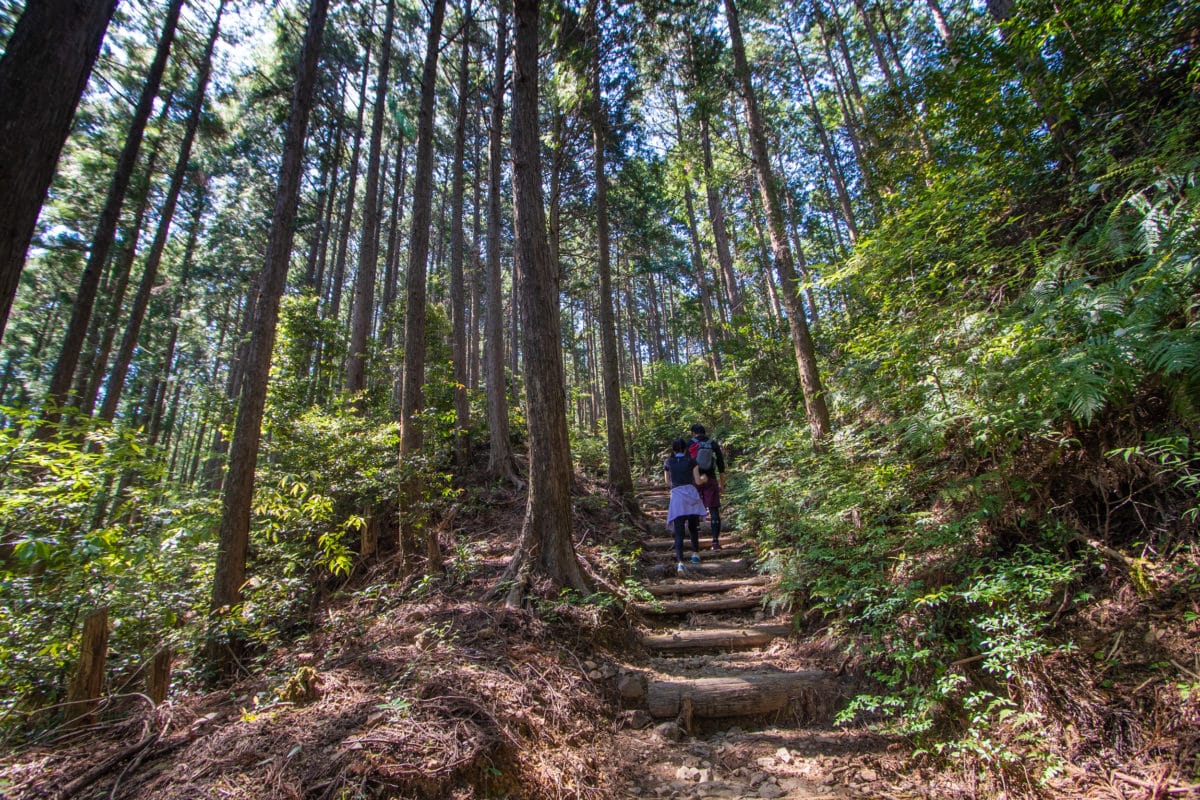
How to Choose Your Specific Hiking Trail
There are lots of different resources these days to find hiking trails on your own, both online and off.
Some online ways to find trails include:
- All Trails is the app I use – it has a large variety of trails and will help you keep from getting lost
- Gaia GPS (they also have an accompanying app)
- You can even find hiking subreddits for up-to-date tips and suggestions from other hikers
But of course, hiking is all about getting away from screens and out into nature, so there are even more ways of finding hikes offline:
- Hiking guide books
- Backpackers Magazine
- Suggestions from local camping or hiking groups
- Ask the staff at your local outdoor store
Using an Operator Who Specializes in Trekking
And if you don’t want to plan it and do it all by yourself (which can be exhausting!), then consider utilizing a company that specializes in trekking & adventure travel holidays such as World Expeditions.
They will plan all the details, provide excellent guides and often even provide gear!
They have tons of hiking styles to choose from that will take you all over the world. I did the East Coast Trail Hike in Newfoundland with them!
Preparation and Training for Hiking
In order to actually enjoy your hike, you must make sure that you are prepared physically for it – trust me – it will be so much more enjoyable that way. You can have all of the right hiking gear with you – but if you aren’t in proper physical condition, no hiking gear is going to make you feel better. Gear can’t work miracles! Check out my article on training for hiking which includes a downloadable hiking training plan that you can easily follow to be prepared!
So now that you know what type of hike you’re doing, it’s time to choose your gear and get packing!
Hiking Packing List – 19 Essential Items to Bring on any Hike
1. Hiking Backpack
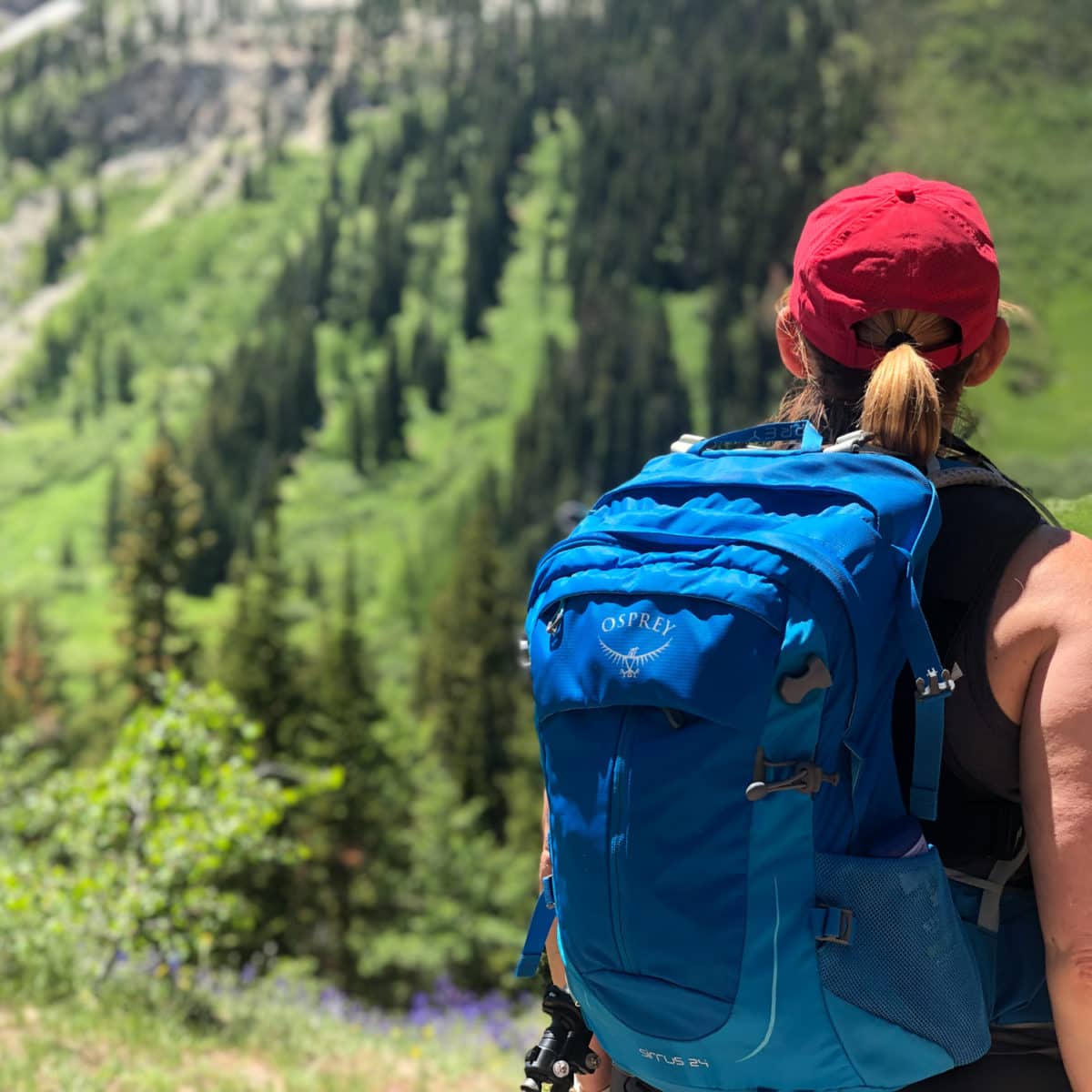
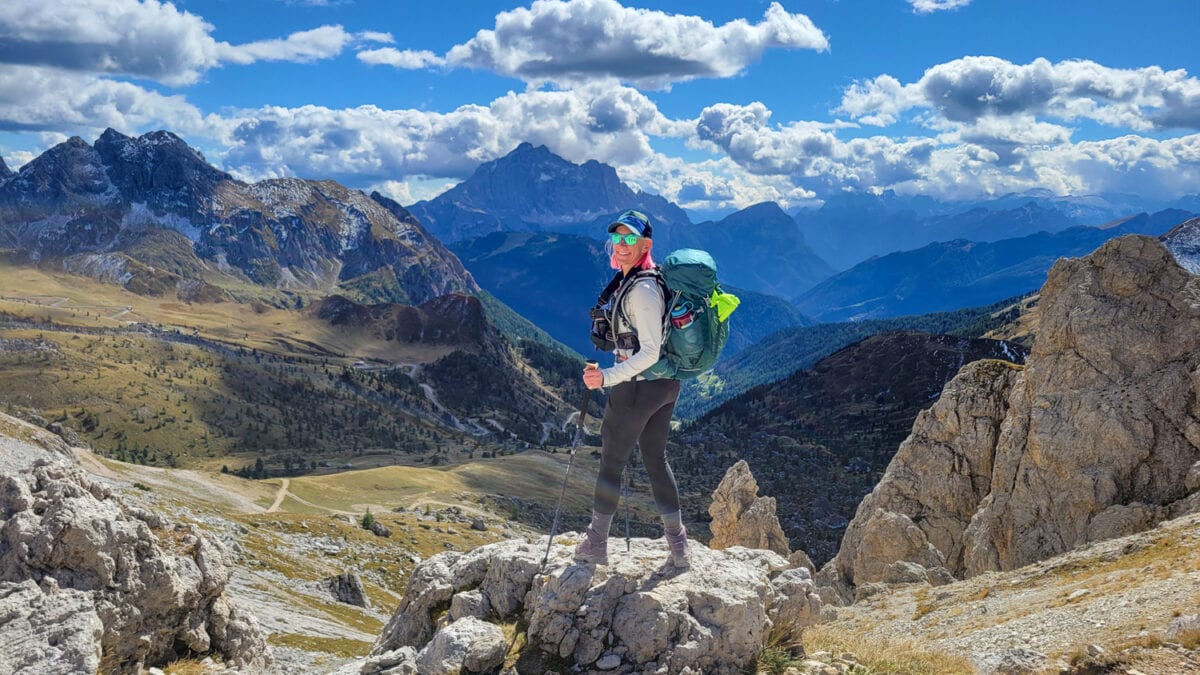
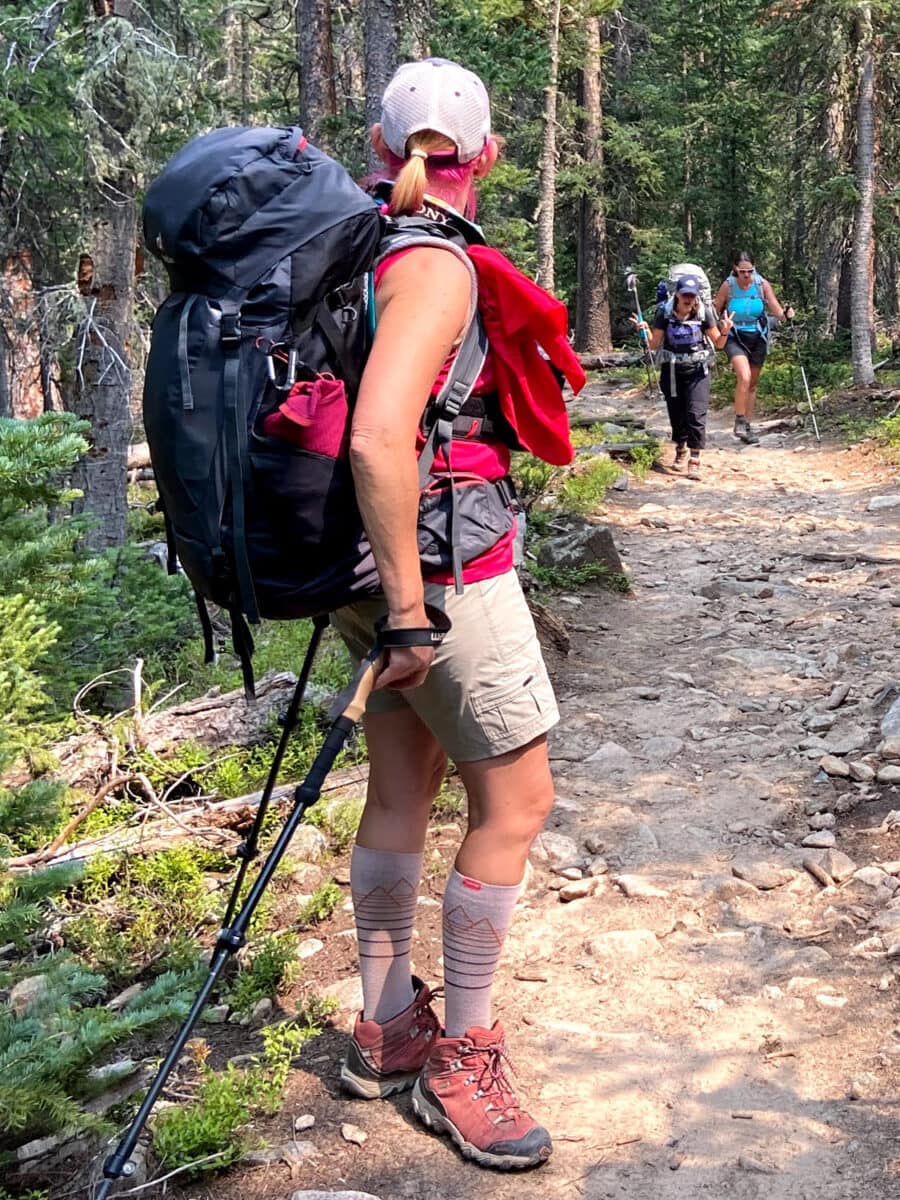
Your hiking backpack is really just an extension of your body when you’re on a hike. It is the item that you will rely upon the most, and the item you’ll likely grow to hate the most too! All I can say is: don’t be frugal when picking a hiking backpack!
How to Choose a Backpack
Consider going to a good retailer such as REI and get fitted for a backpack that suits your body type and hiking goals. There are styles for men’s and women’s bodies which is really important. Put weights in it and test it out by walking around the store. For the last backpack I bought I was in REI for an hour talking to salespeople while carrying around a weighted pack just to see if it worked for me or not!
The size and type of backpack you use depend entirely on the length of the hike.
- Day Hike – 24 Liters or smaller
- Multi-Day Hike without camping gear or meals – 40L or smaller
- Backpacking (bringing camping gear & food) – 60 L or smaller
Recommended Hiking Backpacks
Osprey Sirrus 24L Day Hiking
Ottsworld Favorite
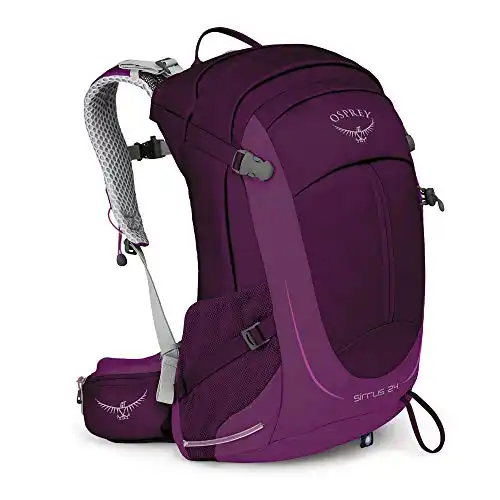
Osprey Packs Sirrus 24 Womens Hiking Backpack
This is my ‘go-to’ day pack for hiking. It’s got a great hip belt and support. It comes with a rain cover – no need to buy it separately! My favorite feature is the Stow and Go Trekking Pole functionality – you can store and easily get out your hiking poles without taking off your pack! Big water bottle holders and space for a water bladder! The perfect pack!
Buy Now
I earn a commission if you click this link and make a purchase, at no additional cost to you.
Osprey is a leader in backpacks, this is my primary pack for day hikes. 24 L is a good size for long-day hiking where you can store rain gear, first aid, water, and snacks comfortably. Other sizes are available though.
My favorite feature is the new Stow-n-Go functionality. This allows you to stow and remove trekking poles in seconds WITHOUT taking off your backpack! Hallelujah! See how it works here.
There are lots of other great features I love about this pack too.
- Its length is adjustable
- It comes with an attached rain cover
- The waist pockets are big enough to fit a phone
- The water system is great
- And it allows air to flow to your back
All this combined with the easy trekking pole access makes this my go-to daypack for short one-day hikes.
Osprey Tempest 30L – Multi Day
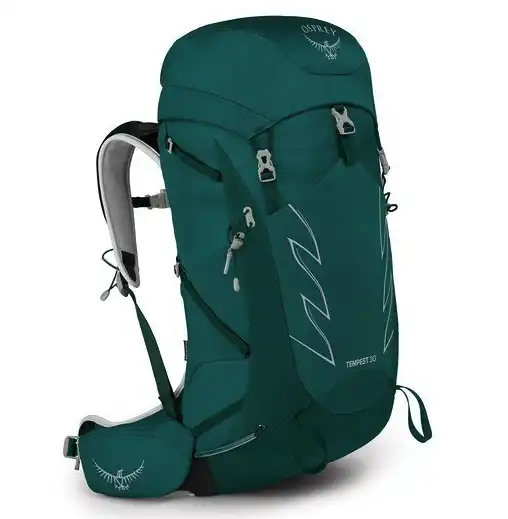
Osprey Tempest 30L Womens
A women’s-specific streamlined top-loader. This versatile lightweight pack offers features—like a reservoir sleeve and trekking pole attachment points that you can get to without taking off the pack (my favorite feature!)
Buy Now
I earn a commission if you click this link and make a purchase, at no additional cost to you.
This 30L pack is great for multi-day hikes where you don’t have to bring camping gear with you. As all Osprey packs it has the Stow and Go pole functionality, adjustable height, sturdy hip belt, and a water reservoir. However, unlike the Sirrus, it doesn’t come with a rain cover.
I used this pack for my Dolomites Hut to Hut 8-day hike. It was perfect for extra layers and rain gear as well as snacks, and a first aid kit. I even fit in some camera gear quite comfortably.
Deuter Futura 45+10 Backpacking
Deuter Futura Vario 45+10
Vari-Slide System allowing exact adjustment to every back length, ensuring the pack sits perfectly on your hips. A comfortable women’s backpack for longer hiking trips that can go from 45L to a max of 55L.
I earn a commission if you click this link and make a purchase, at no additional cost to you.
04/01/2023 07:17 pm GMT
This is the perfect size for multi-day hikes that require more gear to come along (think Camino de Santiago, St. Olav’s Way).
This particular pack is part of Deuter’s women’s series because women are built differently than men…duh. It has a Vari-Slide System allowing exact adjustment to every back length, ensuring the pack sits perfectly on your hips. Plus the waist belt also moves with you as you step, ensuring comfort for long-term wear.
I carried about 33 pounds in it for my Hut-to-Hut hiking in Maine and it worked great. I had no back or shoulder pain and the back ventilation system kept me cool.
2. Hiking Boots and Shoes
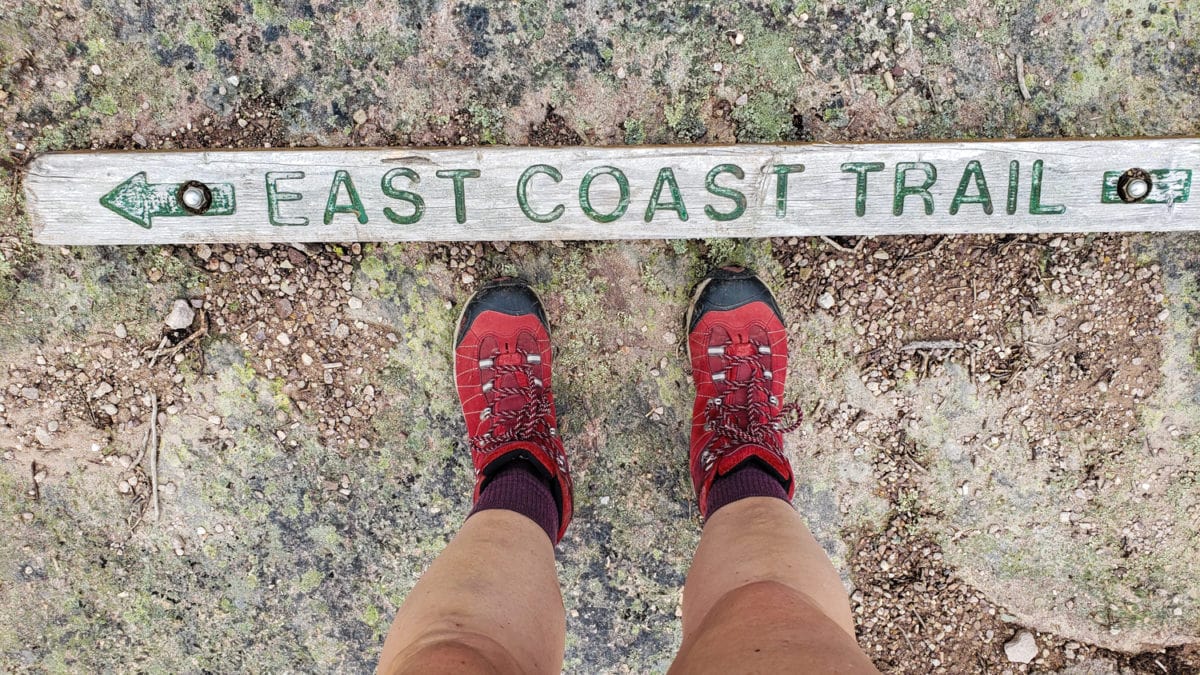
When it comes to footwear and hiking, there are lots of questions that might be circling around in your head. Should you bring boots, tennis shoes, or hiking sandals? That all depends on the type of hike you are doing! Find out about the terrain of the hike and if in doubt, bring hiking boots, you can never go wrong with them!
Tips for Choosing the Perfect Hiking Boots
- A good rule of thumb when getting new hiking boots is to make sure that they have plenty of room in them. As you hike, your feet get hot and sweat and your feet tend to expand. You’ll want extra room in the toebox for that expansion. I normally go a 1/2 size larger than my normal shoe size.
- Get waterproof boots! Even if the climate isn’t rainy, you’ll have these boots for many hikes to come, and besides that, puddles and streams are everywhere no matter the season, and there are few things worse than hiking in wet or damp boots.
- Break them in before your big hike! Make sure you start wearing them right away (well before your planned hike) and wear them everywhere you go. Everywhere. You need to put in your time wearing them before your big hike, or else expect issues and bring lots of band-aids!
Oboz Bridger Hiking Boots
I am a huge fan of Oboz brand boots. I use their winter Bridger Insulated hiking boots, and their regular Bridger boots, as well as their Sawtooth Low hiking shoe. Their footbed and arch support are great, and that’s really important to me.
Plus, they are a certified B Corp and they plant a tree for every pair of shoes sold!
Favorite
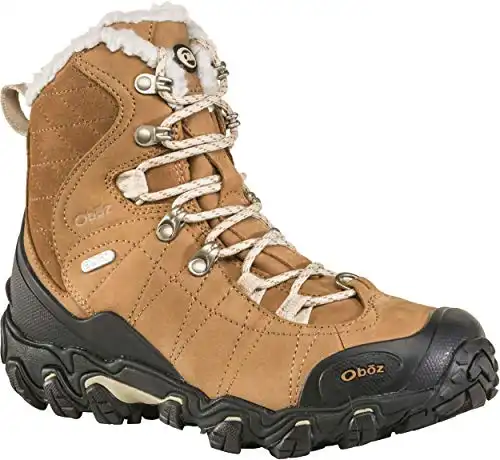
Oboz Bridger 7″ Insulated B-Dry Hiking Boot
Sooo – comfortable and warm! These are my go-to winter insultated boot. I use them for snowshoeing and everyday around town stuff when it’s really cold. O Fit Thermal insoles provide stability and support while reducing heat loss to keep your feet happy!
REI.com
Amazon
I earn a commission if you click this link and make a purchase, at no additional cost to you.
Ottsworld Favorite
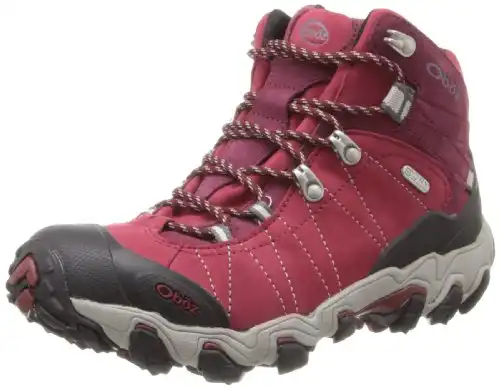
Oboz Women’s Bridger Bdry Hiking Boot
My favorite hiking boot. I have hiked with them all over the world. Rugged boots with great footbed support. Sole is great for rocky trails, and the color is pretty cute too! Great for hard hikes and thru hikes.
REI.com
Amazon
I earn a commission if you click this link and make a purchase, at no additional cost to you.
I also have used Lowa Renegade boots with GORE-TEX which are also really great. This German brand has been around for a long time and makes a great hiking boot too as another alternative.
When You Might Want Trail Running Shoes Instead
If you are indecisive on hiking boots vs tennis shoes, then consider a trail running shoe. It’s sort of the middle solution between the two.
I actually hiked the whole 5-week Camino de Santiago trail in trail running shoes and they were lighter than boots, but still had a supportive and good tread. But they weren’t great in the mud, but those days were minimal overall.
La Sportiva Womens Jackal II Trail Running Shoe
Sturdy sole good enough for light hiking. Lightweight and breathable – but not waterprood. Plus you can wear them on the trail or in the city – a great travel shoe option with dual uses!
I earn a commission if you click this link and make a purchase, at no additional cost to you.
03/31/2023 12:32 am GMT
3. Sandals
Don’t forget to pack a comfortable pair of sandals for multi-day hikes if you have room! Nothing feels better than taking off your boots after a long hiking day and letting your feet have a little comfort. In fact – I’m starting to see more and more specific sandals for recovery. They have plusher footbeds and feel like you are walking on a cloud!
I recently started wearing Chacos again after I found out that they now have an option that doesn’t have a toe loop. I’m not a big fan of the toe loop and apparently, there are others like me as Chaco makes them without toe loops now! I bring my Chacos everywhere now for comfort and ease after hiking. It’s like putting on a slipper! I hang them off the back of my backpack just in case I feel like switching out of my hiking boots during the day, or if we have particularly big water to cross.
4. Hiking Shirts to Pack
Obviously, clothing is a personal choice. However, when you’re hiking, you’ll want to make sure you wear layers. And – of course the clothing I’m recommending is for women…because I’m a woman. Sorry guys. But these brands also make men’s hiking clothes too.
How to Layer Your Hiking Clothes
On a hike, you need to be able to warm up or cool down quickly by simply taking off or adding clothes.
You should have a base layer shirt or tank, and then multiple layers of long sleeves and jackets depending on the climate. And then on the bottom, you’ll want to use a long underwear base layer in cold climates under your hiking pants. Or if it’s a hot climate you might want to try the zip-off-to-shorts hiking pants. Sure, they aren’t sexy, but they are great for hiking.
Pay Attention to the Fabrics
Whatever you do, cotton clothes don’t have a place on your hiking packing list! They take forever to dry and just don’t wick the moisture away from your body which can leave you cold. Ideally, your hiking packing list should be filled with natural fibers such as merino wool or alpaca. These are more expensive pieces – but they really are miracle textiles: they are odorless, dry fast, lightweight, warming, and cooling…they really are miracle fabrics.
A less expensive option is a synthetic material that is quick dry and lightweight since you may have to wash things and have them dry overnight. Some of my favorite hiking brands for shirts are Fjallraven, Jack Wolfskin, and Title Nine.
Fjallraven Abisko Cool T-Shirt
I love this shirt because it’s a flattering shape instead of just a boxy t-shirt. Made from pliant functional material with tencel and organic cotton that wicks away moisture and gives a comfortable feel against the skin. I also like the striped pattern that is a little unique for hiking clothes!
I earn a commission if you click this link and make a purchase, at no additional cost to you.
04/02/2023 03:02 pm GMT
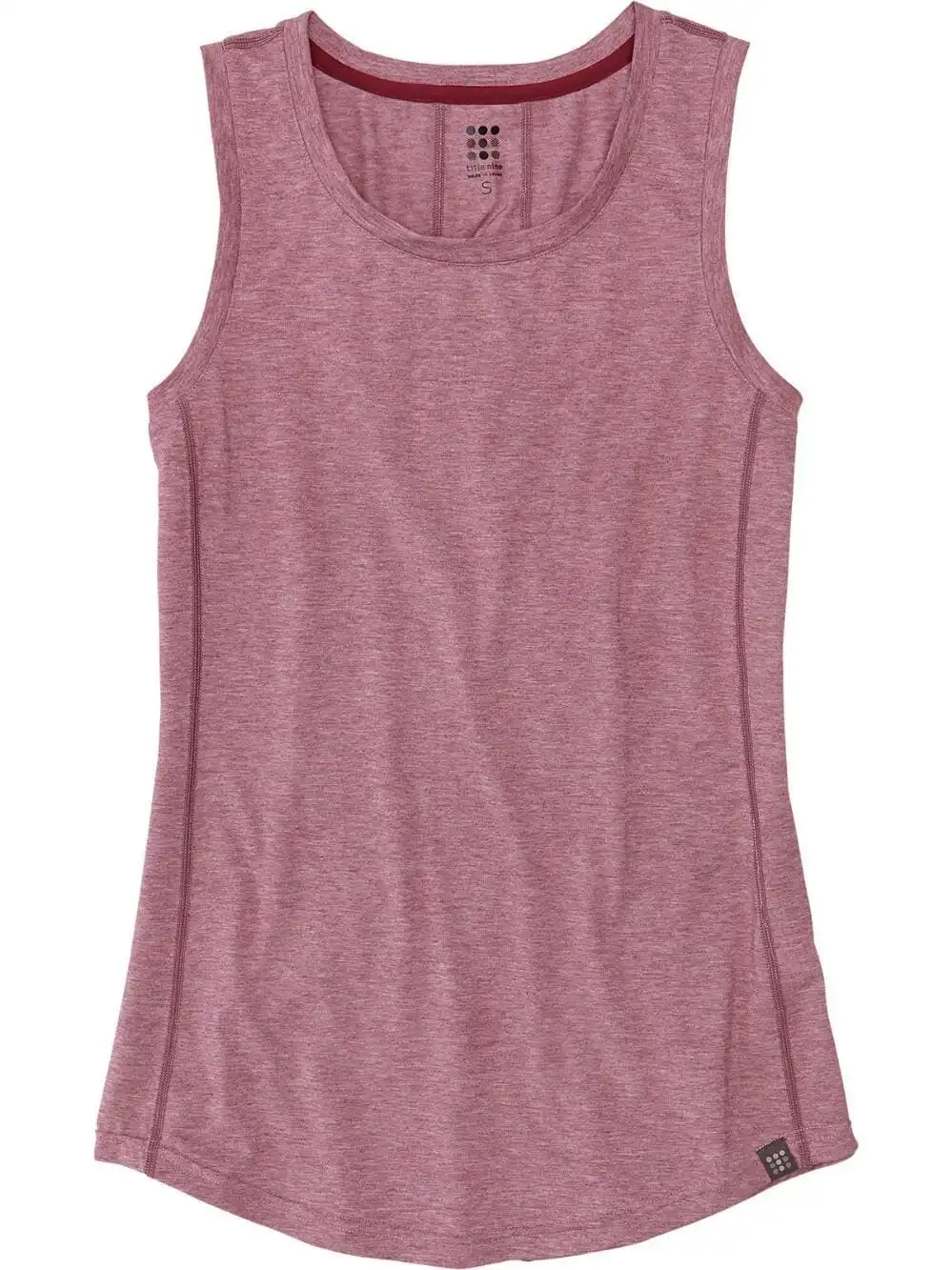
Title Nine Vibe Tank Top
I love Title Nine’s tanks because they’re super soft and dry fast. Made of a poly/cotton/spandex blend infused with drirelease®; performance wicking that dries 4x faster than cotton. I can wear this on the hiking trail and also traveling around an urban environment.
Buy Now
I earn a commission if you click this link and make a purchase, at no additional cost to you.
Jack Wolfskin Crosstrail
I love how soft this shirt is! Feels great to hike in and to simply travel in!
I earn a commission if you click this link and make a purchase, at no additional cost to you.
04/02/2023 05:02 pm GMT
5. Hiking Shorts
This summer I fell in love with my Title Nine Rouge shorts because they are light as a feather! They are made of stretchy fabric great for hiking and they will dry super fast if you want to wash them in the sink overnight! If you want a more substantial hiking short – then the Title Nine Clamber Short is also a super option.
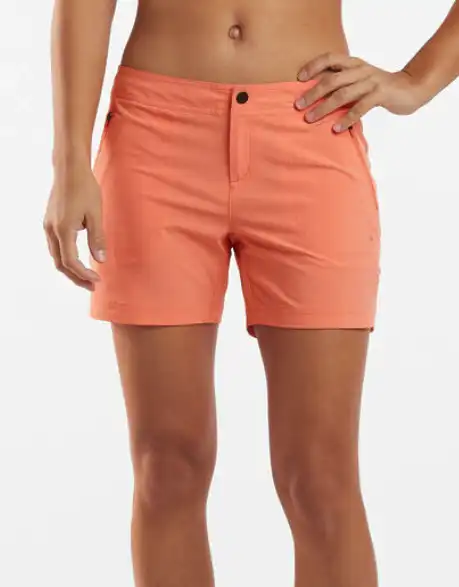
Title Nine Rouge Shorts
These are so so lightweight! They dry fast, take no room in your suitcase, and are stretchy and comfortable. My favorite shorts for the summer!
Buy Now
I earn a commission if you click this link and make a purchase, at no additional cost to you.
My Top Pick
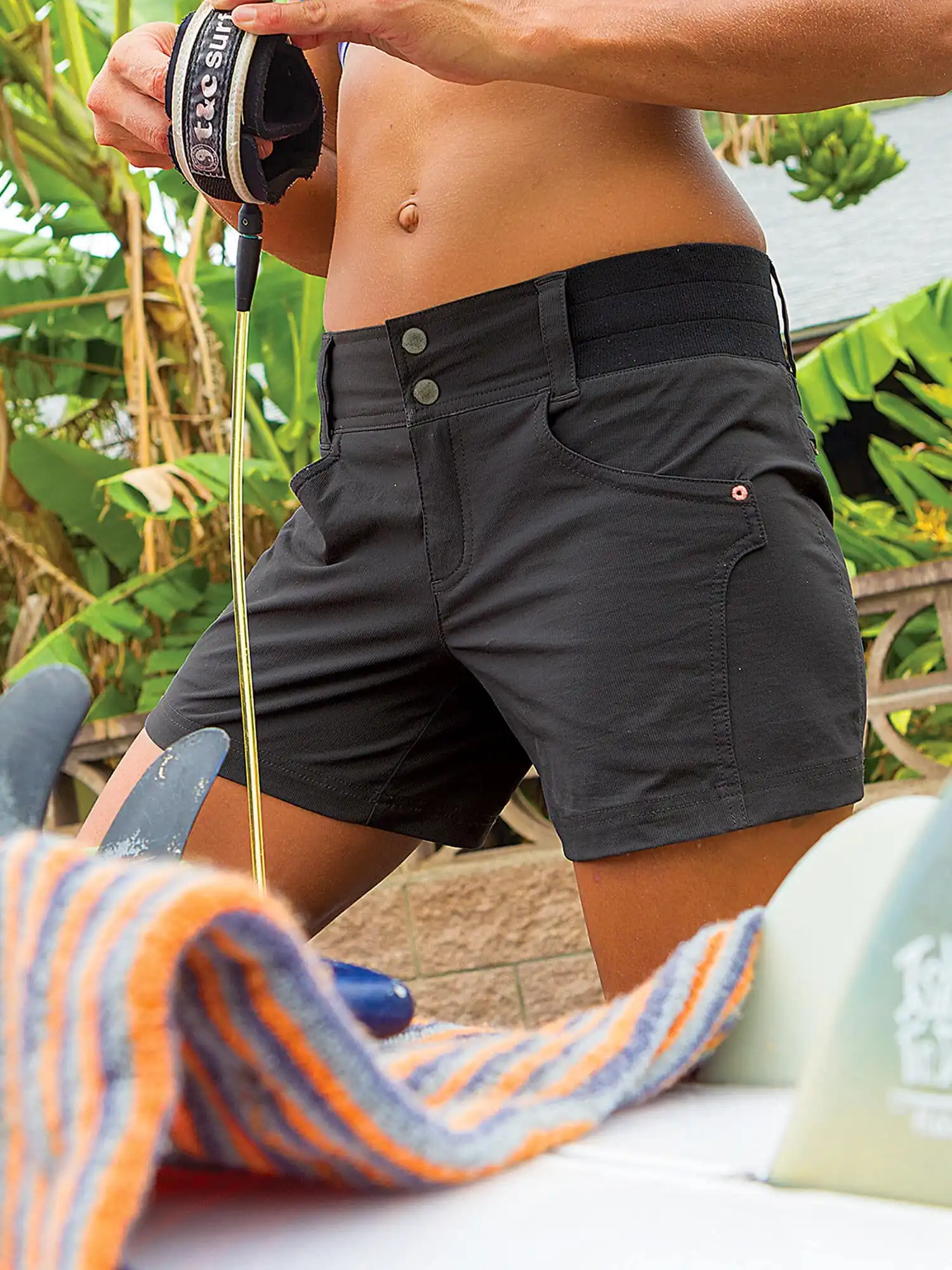
Clamber Women’s Hiking Shorts from Title Nine
I love the Clamber hiking pants, so of course I would love the Clamber short too! Rugged enough for every adventure and misadventure. I love the stretchy waist band for ultimate hiking comfort as well as the phone pocket.
Shop Now
I earn a commission if you click this link and make a purchase, at no additional cost to you.
6. Hiking Pants and Tights
Recently we’ve seen a change in hiking bottoms for women – the entrance of the hiking tight or legging. These aren’t your normal yoga tights – they are specific for hiking with reinforced knees, and flatlock seams so there is no rubbing or chaffing on a long hike. Also – a benefit of trekking tights is that they can be worn as a base layer and you can pull regular hiking pants over them.
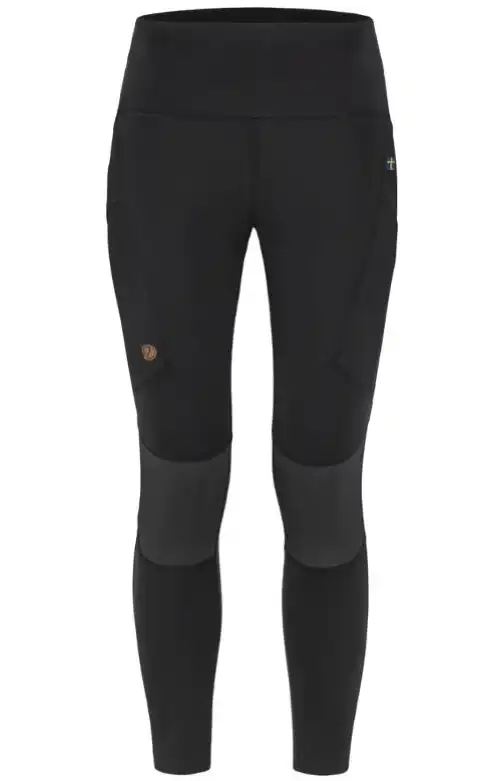
Fjallraven Abisko Trekking Tights Pro
These are great for fall trekking where you need a little more warmth than shorts. I love the reinforced knees and butt which makes them durable enough to sit on a rock and eat lunch. Plus – I love the side pockets and comfortable waist band.
Buy Now
I earn a commission if you click this link and make a purchase, at no additional cost to you.
The Title Nine Clamber Pants are my go-to hiking pants for Fall/Spring. They are stretchy, water resistant, and have great pockets to fit your phone! I love the stretchy waistband as it fits me without having to use a belt. I wear these pants day after day after day…even on the plane.
Ottsworld Favorite
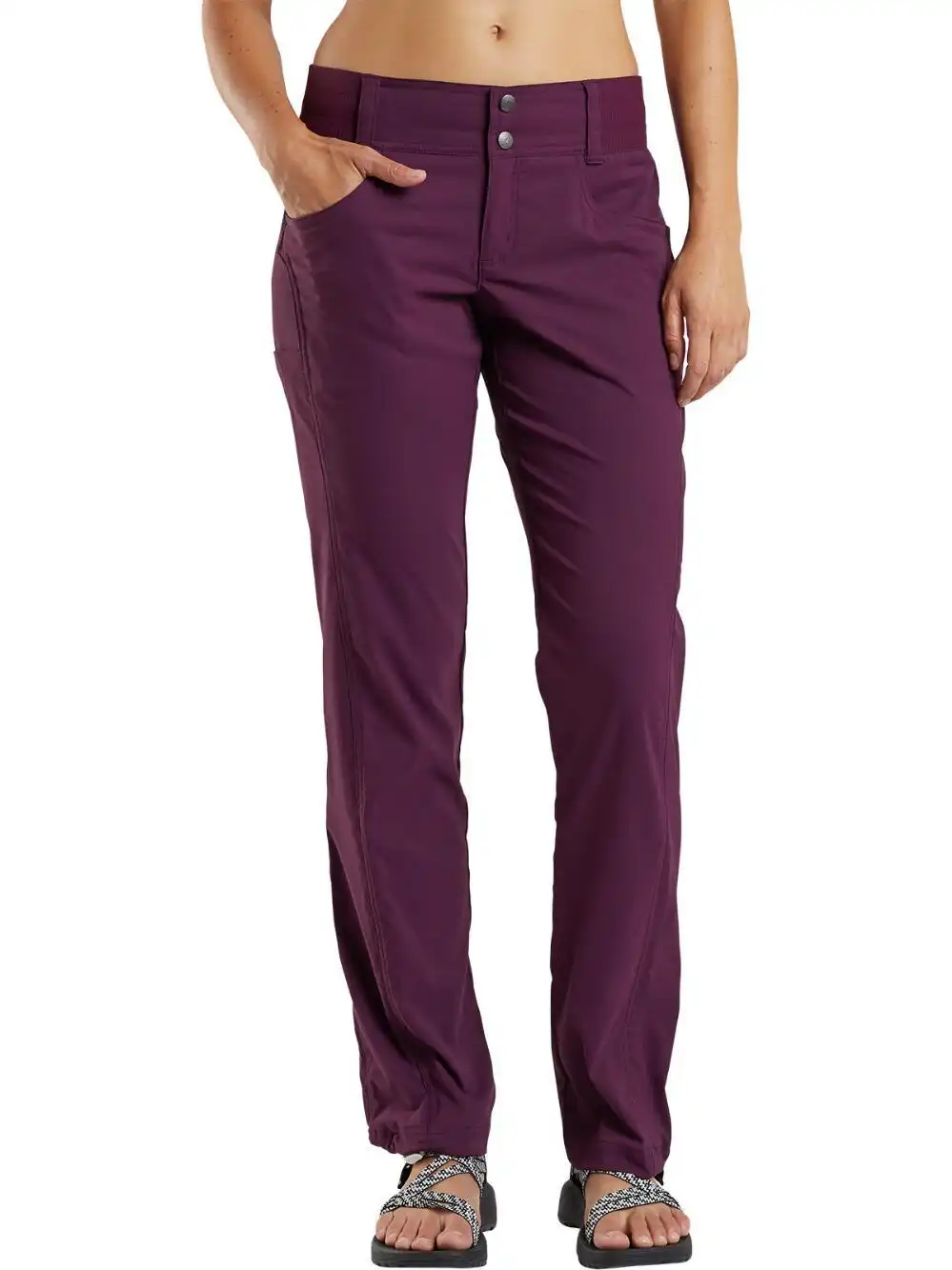
Title Nine Clamber Pants
I love these pants!! They’re great for fall/spring, are stretchy, but water resistant, with great pockets! I love the stretchy waist band as it fits me without having to use a belt.
Buy Now
I earn a commission if you click this link and make a purchase, at no additional cost to you.
Cold Weather Hiking Jackets
Jack Wolfskin makes a high-performance super lightweight down hoodie that I love. And the best part is that it packs down so small that it barely takes any space in your pack.
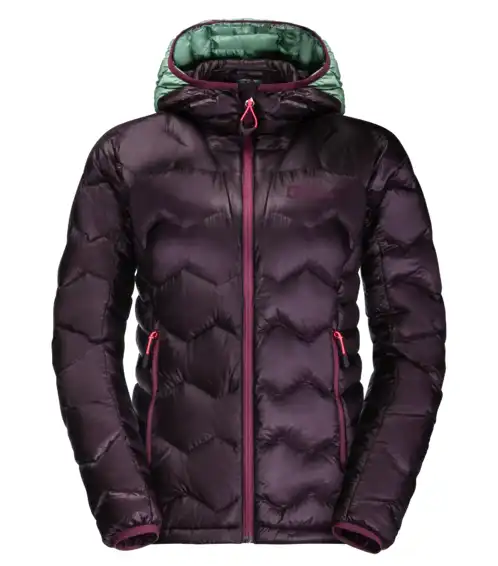
Jack Wolfskin Alpspitze Down Hoody
This is a great warm jacket for summits. It’s windproof, water repellent and breathable, but so warm. It also packs down into a little sack that is the size of a pint glass…making it perfect to stuff in your backpack.
Buy Now
8. Hiking Socks
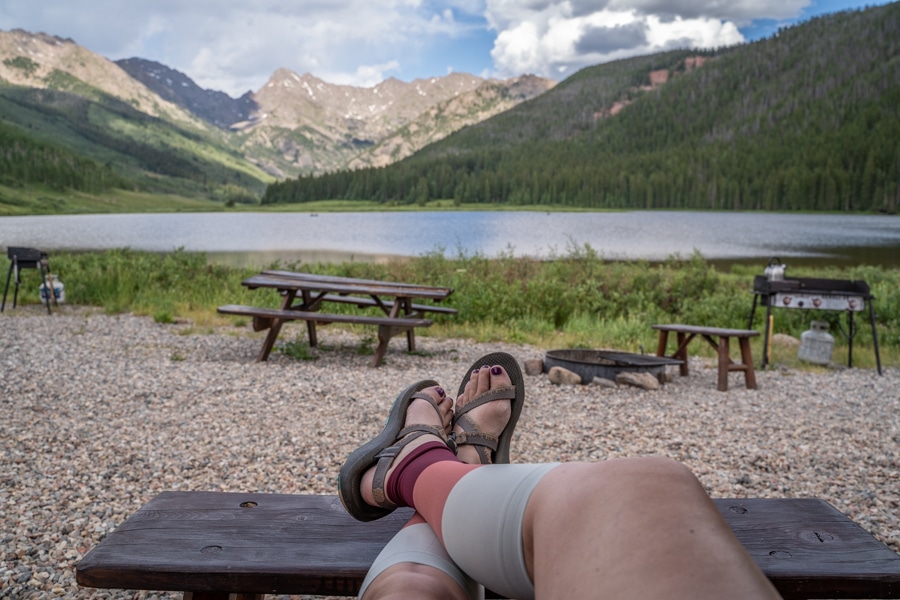
I use merino wool socks for hiking and general travel. Wool is a great material for hiking, it dries fast and the best part is that the odor diminishes too! Perfect for people with sweaty feet like me!
I’ve also started using
My top pick
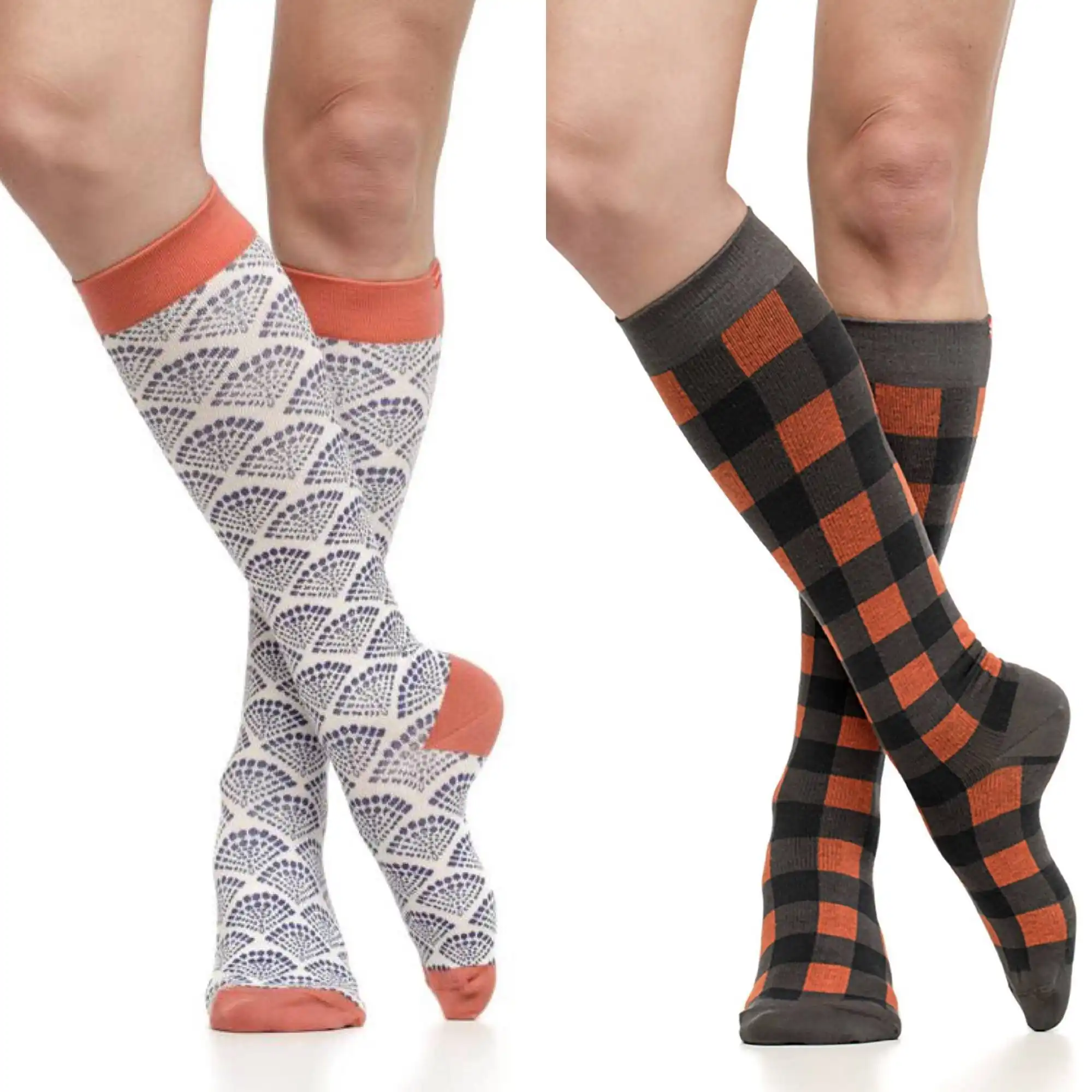
Point6 Essential Crew Sock
The cozy merino wool cushioning next to the skin insulates the foot from hot spots. Now featuring 37.5 Technology to keep you dry in the office or on the mountain.
I earn a commission if you click this link and make a purchase, at no additional cost to you.
04/04/2023 10:47 pm GMT
9. Hat and Sun Protection
No matter if you are hiking in a hot climate or a cold one, you’ll want sun protection! Make sure you have a hat with a good brim, sunglasses, and sunscreen.

Don’t forget the lips! I always forget this and then end up sunburned, and with dry lips the whole hike! Make sure you bring plenty of lip balm with SPF.
10. Hiking Rain Gear
This is essential…unless if maybe you are hiking in the Sahara Desert!
There are a lot of options when it comes to hiking rain gear. You can go all out and bring waterproof pants and a waterproof jacket, or go a cheaper route and just take a good rain poncho that will cover most of you and your backpack.
I’ve used both methods, and it normally depends on the climate. If I’m hiking in a hot rainy climate then a poncho is great. But if it’s a cold weather rainy climate like New Zealand or Alaska, then you’ll want full rain gear. Plus – note that your rain jacket/pants can also serve as a wind barrier in rough weather – however, a poncho doesn’t really help protect you against the wind at all.
If you do choose to go with pants and a jacket, then don’t forget you’ll also need a rain cover for your backpack! Just make sure your rain pants are large/roomy and easy to pull on over your other layers.
I recommend GORE-TEX products if you can swing it – they really are the best on the market which is why they tend to cost more. Be on the lookout for their new GORE-TEX ePE (expanded Polyethylene)membrane. It is a key milestone in Gore’s ongoing sustainability journey, providing high-performing, durable products that are engineered for long useful life. GORE-TEX has been able to manipulate PE to create a membrane that is light, and thin yet strong and enables durable waterproof, windproof, and breathable performance. The membrane can then be bonded to textiles (such as backer or face textiles) to form a GORE-TEX Laminate. The laminate is used by outdoor brands to create finished products including footwear, gloves, and garments that are backed by the brand’s renowned GUARANTEED TO KEEP YOU DRY Promise.
Endure GORE-TEX Paclite Rain Jacket
GORE-TEX is simply the best rain protection there is. I use this GOREWEAR jacket for both hiking and biking. It’s so light and packable – made with their special Paclite material. It’s actually guaranteed to keep you dry.
12. Protect Your Stuff with a Drysack
If you don’t have a rain cover for your backpack, consider putting important items in a dry sack inside of your backpack. (Or the budget option is to use a garbage bag as a liner inside your backpack!)
Dry sacks are also good for simply organizing your pack so that you can quickly find things. Many of them come with
13. Hydration Systems
You need at least 3 Liters of water per day. It’s a good idea to drink plenty of water before your hike to get your body well-hydrated at the get-go. Then, of course, you’ll want to make sure you stay hydrated while on the trail, too.
Take water bottles or a water bladder (sometimes also called a hydration bladder or hydration reservoir) that has a straw and you can hike without having to stop to drink.
Not sure which you should use? I’m someone who doesn’t seem to hydrate enough when I’m drinking out of a bottle. However, I’ve noticed that I drink much more regularly when I use a water bladder, as I can easily drink while I hike. Test which you prefer before your trek.
Osprey Hydraulics Water Bladder
My favorite is this Osprey water bladder because it’s easy to fill and it carries 3 L of liquid.
The Osprey bladder has a big opening for super easy filling and emptying, and they no longer have twist-on caps – they instead have a fold-over clamp that ensures there’s no spilling and it’s so easy to use.
In addition, the hose detaches in two places so that it’s easier to clean and get in and out of your backpack.
Finally, my favorite part is the magnet that you put on your backpack strap and holds the straw in place so it doesn’t flop around or end up in the dirt when you put your pack down.
Favorite
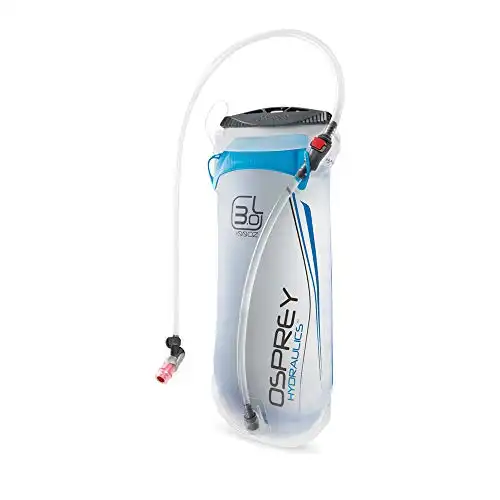
Osprey Hydraulics Reservoir
This is the best water reservoir I’ve used. It’s big opening makes it easy to fill in any sink and easy to clean, and I love the tube that comes in two parts making it so much easier to put in and out of your pack! They’ve really thought of everything!
Osprey.com
Amazon
I earn a commission if you click this link and make a purchase, at no additional cost to you.
Water Purifier
Also, make sure to find out how readily available clean drinking water will be on your trek. If it isn’t available, then take a SteriPEN or Grayl Water Purifier with you.
The SteriPEN is a compact, handheld, ultraviolet light (UV) water purifier designed specifically for outdoor/expedition use.
The Grayl is about the size of a water bottle. You can effortlessly fill it from any spigot, hotel sink, murky river, taco stand, lake, or well.
GRAYL Geopress 24 oz Water Purifier
For Global Travel, Backpacking, Hiking, and Survival
I earn a commission if you click this link and make a purchase, at no additional cost to you.
04/03/2023 07:17 am GMT
14. Hiking Snacks
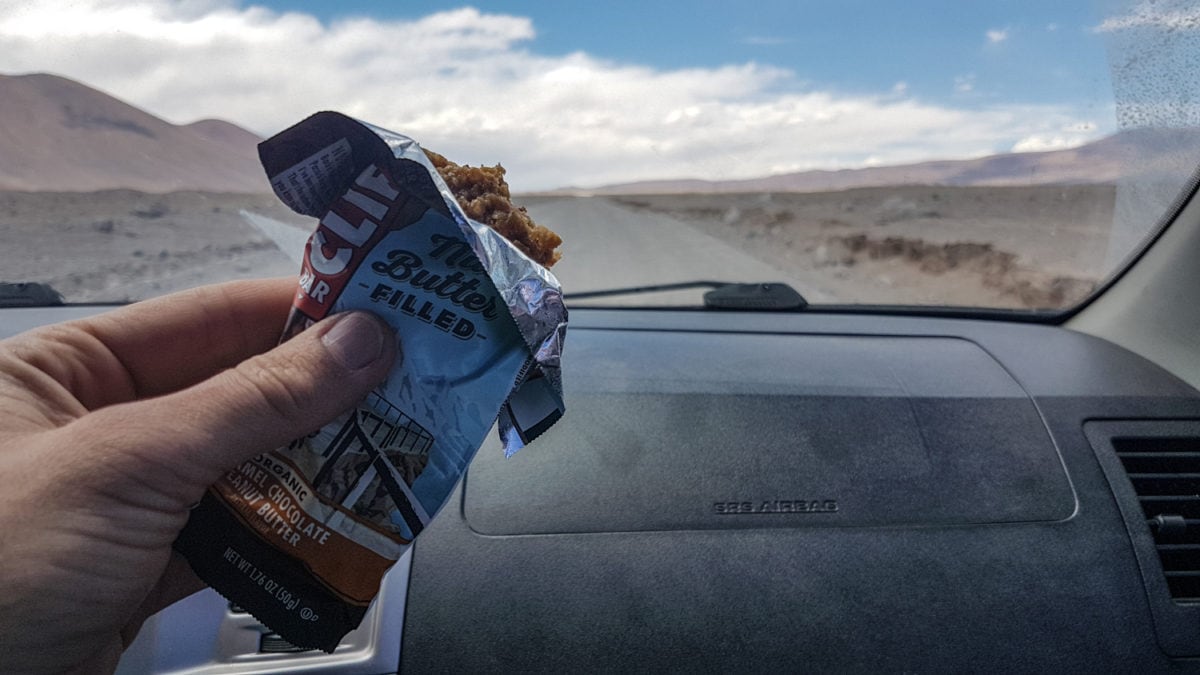
Food is your fuel! Make sure that you bring high-energy snacks with you. Even if you’re on a hike where food is provided, still bring a few snacks for emergency situations. I like to bring Clif Bars, Kind Bars, Almond Butter, or fresh/dried fruit and nuts.
15. Hiking Poles
Hiking poles are great for balance and help you avoid having an accident. However, it’s a very personal decision; some people love them, some people only love one, and some hate them. Do what’s right for you.
I am a big fan of hiking poles – especially after my knee surgery! I love the Montem hiking poles – they are very light and sturdy (but reasonably priced!) – as well as the LEKI Micro Vario poles, which break down much smaller than most hiking poles.
Don’t know how or why you should use hiking poles? Check out this great article by my friend and trainer (specializing in hiking), Becki Rupp – 5 Tips for Using Hiking Poles.
LEKI Makalu FX Carbon
Super lightweight and easily folds up to fit in a suitcase or backpack.
I earn a commission if you click this link and make a purchase, at no additional cost to you.
03/31/2023 11:47 am GMT
17. Satellite-Connected Communication Device
This is the ultimate safety solution. It allows you to navigate, send messages, and get help even if you’re out of cell service range.
I’ve used the Garmin InReach service and like it.
This is especially essential if you are going off the grid.
Other Extra Safety Items for the Trail
Whistle: just in case I get lost or fall and am injured.
A lighter, waterproof matches, or firestarter: another “just in case”
Duct tape: literally the fix-all solution. Hole in your tent? Duct tape. Does your boot sole start to peel off? Duct tape.
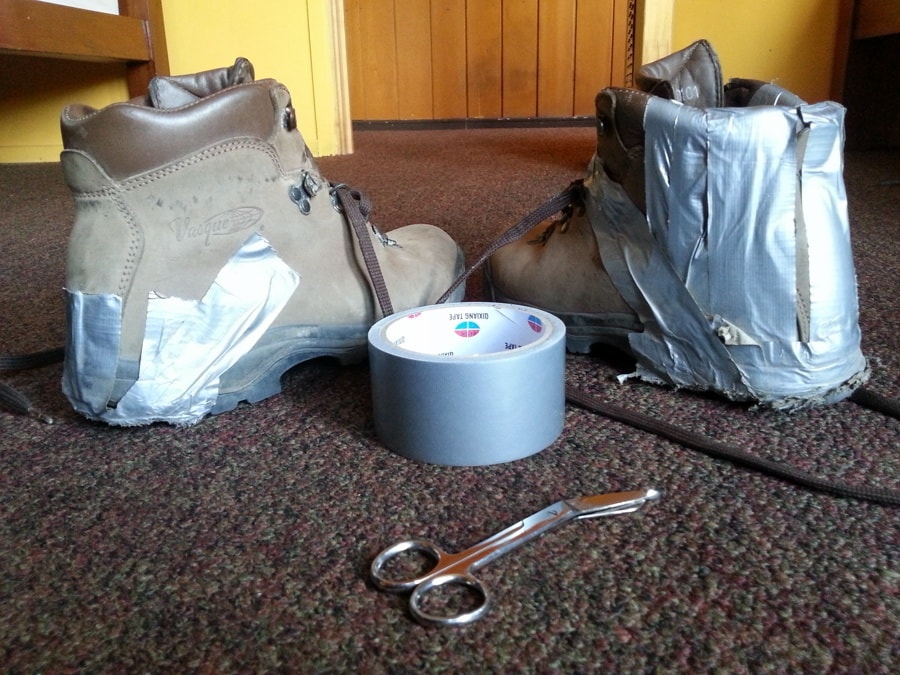
18. Headlamp
I know most people think they’ll just use your phone instead of bringing a headlamp. However in terms of safety – you want to do anything you can to elongate the life your phone battery – so don’t use it up as a flashlight!
Headlamps are great in case your hike goes longer than expected and you have to hike in the dark. I like to use a headlamp that also has a red light setting so it’s not as abrasive at a campsite.
19. Navigation Tools
You definitely don’t want to lose your way when hiking, so make sure that you have some solution for finding your direction on your own.
If you’ll have a connection, you can just bring a phone with a trails app and a way to keep it charged (great for day hikes that are in cell range). A solar-powered portable charger might be smart if you go this route, as well, but depending on the hike, a regular pre-charged portable charger will do.
If you’ll be out of range, a satellite-connected GPS is always a safe choice.
Of course, you can also go vintage and take paper maps and a compass! Just make sure you know how to use them before you hit the trail if you don’t already know how!
So there you have it! My ultimate list of hiking packing list! Hopefully, now you have a clearer idea of what you need to pack based on what type of hike you plan to go on, and a few suggestions to get you started!
Was there something on this list you didn’t know or expect? What’s your must-have hiking gear when you hit the trails?
Let me know in the comments!
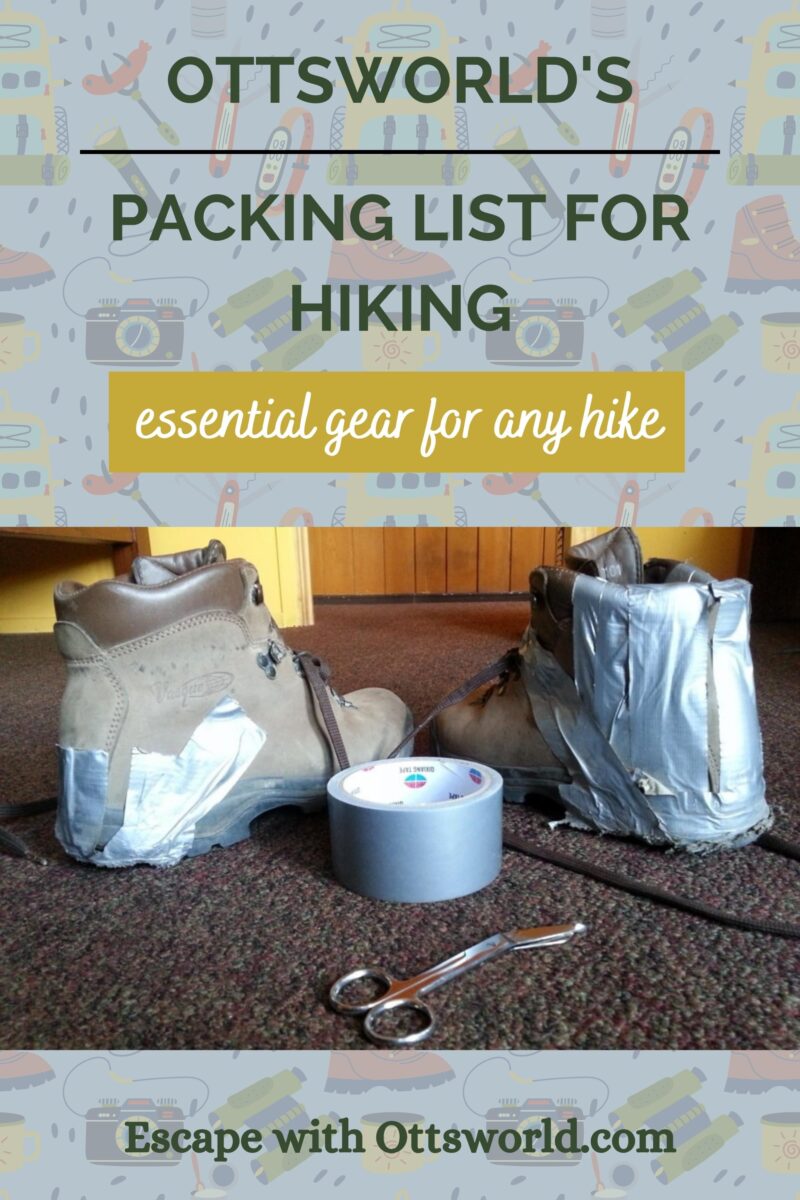
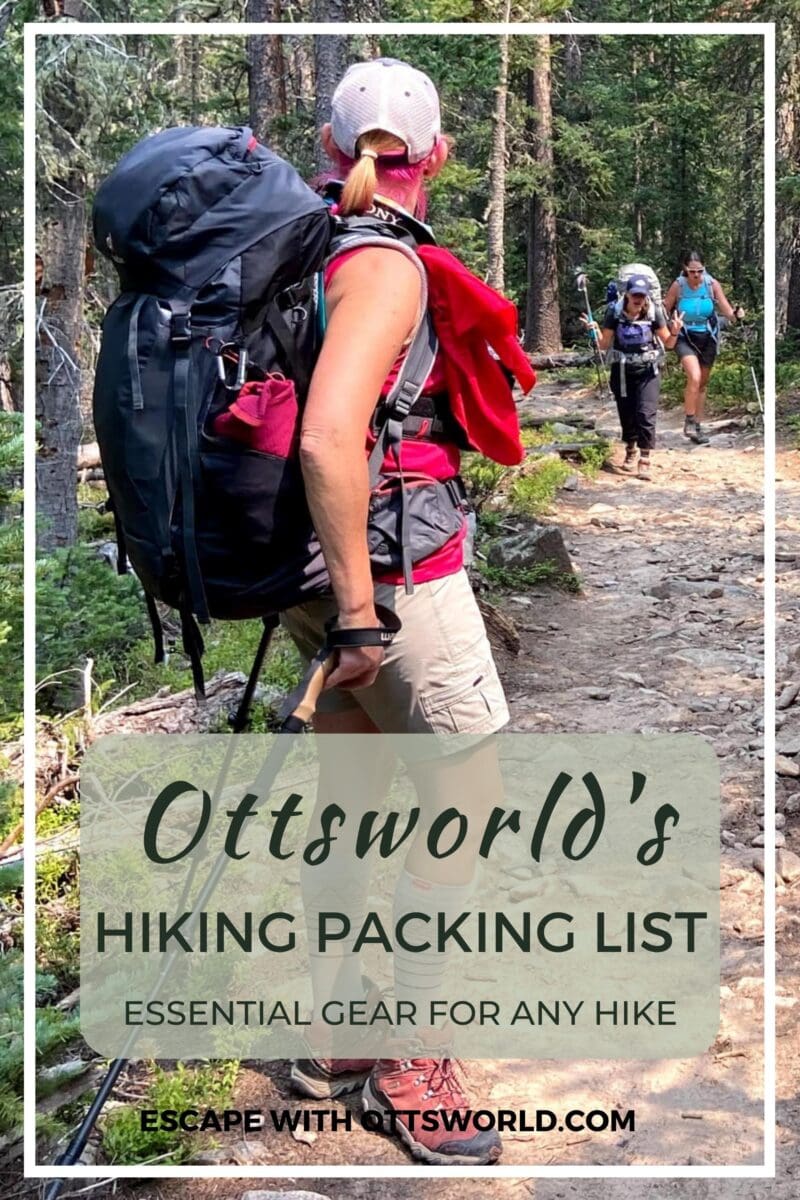
Related
Disclosure:
This article is brought to you by World Expeditions , and #BestMountainTrek. However, all opinions expressed here are my own based on my own hiking experiences.

